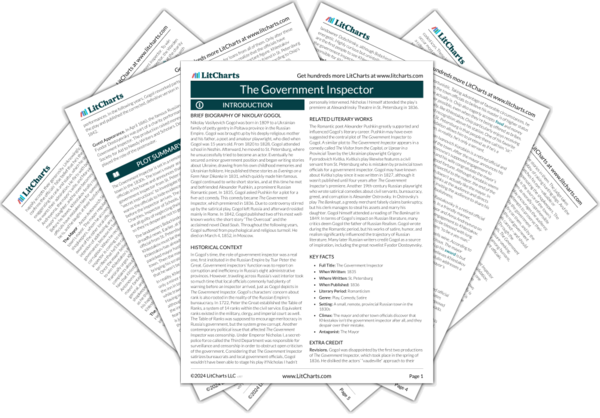Brief Biography of Nikolay Gogol
Nikolay Vasilyevich Gogol was born in 1809 to a Ukrainian family of petty gentry in Poltava province in the Russian Empire. Gogol was brought up by his deeply religious mother and his father, a poet and amateur playwright, who died when Gogol was 15 years old. From 1820 to 1828, Gogol attended school in Nezhin. Afterward, he moved to St. Petersburg, where he unsuccessfully tried to become an actor. Eventually he secured a minor government position and began writing stories about Ukraine, drawing from his own childhood memories and Ukrainian folklore. He published these stories as Evenings on a Farm Near Dikanka in 1831, which quickly made him famous. Gogol continued to write short stories, and at this time he met and befriended Alexander Pushkin, a prominent Russian Romantic poet. In 1835, Gogol asked Pushkin for a plot for a five-act comedy. This comedy became The Government Inspector, which premiered in 1836. Due to controversy stirred up by the satirical play, Gogol left Russia and afterward resided mainly in Rome. In 1842, Gogol published two of his most well-known works: the short story “The Overcoat” and the acclaimed novel Dead Souls. Throughout the following years, Gogol suffered from psychological and religious turmoil. He died on March 4, 1852, in Moscow.
Historical Context of The Government Inspector
In Gogol’s time, the role of government inspector was a real one, first instituted in the Russian Empire by Tsar Peter the Great. Government inspectors’ function was to report on corruption and inefficiency in Russia’s eight administrative provinces. However, traveling across Russia’s vast interior took so much time that local officials commonly had plenty of warning before an inspector arrived, just as Gogol depicts in The Government Inspector. Gogol’s characters’ concern about rank is also rooted in the reality of the Russian Empire’s bureaucracy. In 1722, Peter the Great established the Table of Ranks, a system of 14 ranks within the civil service. Equivalent ranks existed in the military, clergy, and imperial court as well. The Table of Ranks was supposed to encourage meritocracy in Russia’s government, but the system grew corrupt. Another contemporary political issue that affected The Government Inspector was censorship. Under Emperor Nicholas I, a secret-police force called the Third Department was responsible for surveillance and censorship in order to obstruct open criticism of the government. Considering that The Government Inspector satirizes bureaucrats and local government officials, Gogol wouldn’t have been able to stage his play if Nicholas I hadn’t personally intervened. Nicholas I himself attended the play’s premiere at Alexandrinsky Theatre in St. Petersburg in 1836.
Other Books Related to The Government Inspector
The Romantic poet Alexander Pushkin greatly supported and influenced Gogol’s literary career. Pushkin may have even suggested the central plot of The Government Inspector to Gogol. A similar plot to The Government Inspector appears in a comedy called The Visitor from the Capital, or Uproar in a Provincial Town by the Ukrainian playwright Grigory Fyorodovich Kvitka. Kvitka’s play likewise features a civil servant from St. Petersburg who is mistaken by provincial town officials for a government inspector. Gogol may have known about Kvitka’s play since it was written in 1827, although it wasn’t published until four years after The Government Inspector’s premiere. Another 19th-century Russian playwright who wrote satirical comedies about civil servants, bureaucracy, greed, and corruption is Alexander Ostrovsky. In Ostrovsky’s play The Bankrupt, a greedy merchant falsely claims bankruptcy, but his clerk manages to steal his assets and marry his daughter. Gogol himself attended a reading of The Bankrupt in 1849. In terms of Gogol’s impact on Russian literature, many critics deem Gogol the father of Russian Realism. Gogol wrote during the Romantic period, but his works of satire, humor, and realism significantly influenced the trajectory of Russian literature. Many later Russian writers credit Gogol as a source of inspiration, including the great novelist Fyodor Dostoyevsky.
Key Facts about The Government Inspector
-
Full Title: The Government Inspector
-
When Written: 1835
-
Where Written: St. Petersburg
-
When Published: 1836
-
Literary Period: Romanticism
-
Genre: Play, Comedy, Satire
-
Setting: A small, remote, provincial Russian town in the 1830s
-
Climax: The mayor and other town officials discover that Khlestakov isn’t the government inspector after all, and they despair over their mistake.
-
Antagonist: The Mayor
Extra Credit for The Government Inspector













